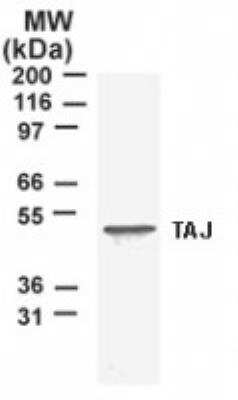TROY (TNFRSF19) Rabbit Polyclonal Antibody
Frequently bought together (2)
Transient overexpression lysate of tumor necrosis factor receptor superfamily, member 19 (TNFRSF19), transcript variant 1
USD 605.00
Other products for "TROY"
Specifications
| Product Data | |
| Applications | WB |
| Recommended Dilution | Western Blot: 0.5-2 ug/ml |
| Reactivities | Human, Mouse |
| Host | Rabbit |
| Clonality | Polyclonal |
| Immunogen | This rabbit polyclonal antibody was developed by immunizing rabbits with a mixture of synthetic peptides corresponding to amino acids 29-44, 204-219, and 409-421 of human TROY (Genbank Accession No. AB040434). |
| Formulation | PBS containing 0.05% BSA, 0.05% Sodium Azide. Store at 4C short term. Aliquot and store at -20C long term. Avoid freeze-thaw cycles. |
| Concentration | lot specific |
| Purification | Protein G purified |
| Conjugation | Unconjugated |
| Storage | Store at -20°C as received. |
| Stability | Stable for 12 months from date of receipt. |
| Gene Name | tumor necrosis factor receptor superfamily member 19 |
| Database Link | |
| Background | Analysis of EST clones and use of a signal sequence trap screening of the murine brain have lead to identification of a new member of the tumor necrosis factor receptor superfamily designated as TAJ and TROY, respectively. TAJ/TROY is a membrane protein of 423 amino acids with characteristic cysteine-rich motifs in the extracellular domain and a tumor necrosis factor receptor-associated factor (TRAF) 2 binding sequence in the cytoplasmic domain. Human TROY has 78% identity at the amino acid level with mouse TROY. The extracellular domain of TROY has significant homology with that of EDAR (another newly identified receptor belonging to TNF receptor family) that specifies hair follicle fate. The cytoplasmic domain of TAJ is different than other TNF receptor family members. Although its cytoplasmic domain does not contain death domain, TAJ/TROY induced cell death is probably mediated through a caspase-independent pathway. TAJ-induced JNK activation was not blocked by dominant-negative inhibitors of TRAF2, TRAF5, or ASK1, which have been previously implicated in JNK activation via TNFR1 and CD40. However, coimmunoprecipitation assays revealed that TAJ is capable of binding a number of different TRAF family members, and it is possible that TAJ-induced JNKactivation is mediated by an as yet untested TRAF homolog, such as TRAF6. TROY mRNA is highly expressed in brain, prostate and embryo and moderately expressed in the heart, lung, liver. |
| Synonyms | TAJ; TAJ-alpha; TRADE; TROY |
| Note | WB: Detects a band of approximately 46 kDa (predicted molecular weight: 50.8 kDa). For optimal results, primary antibody incubations should be performed at room temperature. |
| Reference Data | |
| Protein Families | Druggable Genome, Transmembrane |
| Protein Pathways | Cytokine-cytokine receptor interaction |
Documents
| Product Manuals |
| FAQs |
| SDS |
{0} Product Review(s)
0 Product Review(s)
Submit review
Be the first one to submit a review
Product Citations
*Delivery time may vary from web posted schedule. Occasional delays may occur due to unforeseen
complexities in the preparation of your product. International customers may expect an additional 1-2 weeks
in shipping.






























































































































































































































































 Germany
Germany
 Japan
Japan
 United Kingdom
United Kingdom
 China
China



